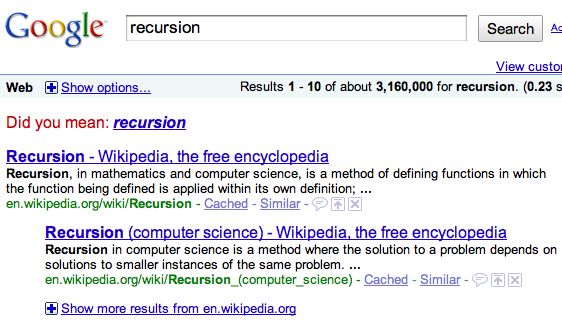-the Centaur
Posts published by “centaur”
-the Centaur

So I want to blog more, ideally approaching one a day. If I was just tossing up blog entries for filler, like I sometimes do, that wouldn't be a problem; however, I'd like to put up more substantive articles. But I find that putting up more substantive articles takes a lot of time - so keep up the pace I need to improve my process.
I already have trained myself to use Blogger more efficiently, use tools like Qumana to make it easier to access Blogger while offline, and am experimenting with AndroBlogger in an attempt to make it easy to post while, well, anywhere I've got my Nexus One. But there are still barriers to putting up entries.
One barrier is my process. Note the last paragraph? It has four links. I like to put in links to topics I reference, so a certain amount of time is taken up finding appropriate web pages and linking them in. There isn't much I can do about this except not go down the rabbit hole - ideally, I'd like to post a short paragraph about each link, but that's too much detail.
Another barrier are my goals. One of my friends, Jim Davies, thinks that blog posts should have pictures - and I agree, though I can't immediately find the blog post in which he said it - perhaps that means we discussed it aloud. So ANYWAY, there was another chunk of time wasted trying to find a link. Where was I? Ah. The barriers of my goals.
If I want to blog an article with a picture, the picture needs to be on the web. But I try to avoid linked images for copyright reasons (and to prevent brittleness in case the target takes it down; for embedded Youtubes, which, well, there isn't a good substitute for yet). So I need to upload the image to MY site, a chore I currently do with the Cyberduck ftp client.
And here the constraints get harder: in precisely the same way I don't let iTunes tell me where to put songs, I choose not to use Blogger's interface because I have scheme for posting images which predates Blogger and which I will continue to use after Blogger is gone: http://www.dresan.com/images/imagename.jpg, which is simple and easy to remember.
What's worse, my cameras take images at huge resolutions, so I need to shrink and resize the images to fit in the width that fits on my website. For a variety of reasons, I go with 800x600 or 600x800, in a standard block of HTML which shrinks the image, adds a link to the source of the image, and ads some alt text.
So now I've put on myself a huge set of constraints which makes the simple task of putting up images on my website a chore - get the picture, resize it, start Cyberduck, upload it, write the two lines of HTML gloop necessary to display it, and then and only then see the preview so I can see I made a mistake. There has to be a better way.

Enter UNIX shell scripting, Python and the ImageMagick toolkit.
The first thing that I did to make my life easier was to auto-generate the stanza of text that displays the image. I mean, it's the same thing each time - an anchor tag pointing to the image, with alt text, then the img tag itself, with the same alt text, sizing and border information, like this:
src="https://www.dresan.com/images/image.jpg" />
So why write ALL of that every time? Why not just write the changes and let the computer do it for you? SO I wrote a piece of code in Python which does just that, produces that text for me:
#!/usr/bin/python
import sys
TEXT= """
"""
if len(sys.argv) < 3:
print "usage: %s image alt text" % sys.argv[0]
else:
image = "http://www.dresan.com/images/%s" % sys.argv[1]
alt = ' '.join(sys.argv[2:])
print TEXT % (image, alt, image, alt)
I'm not going to turn this into a Python tutorial, so, briefly, all this does is check to make sure I specify a filename and some alt text, stuffs it into a template, and prints it out so I can cut and paste. Here's an example of that in operation, turning chihuly.jpg and "chihuly art at palo alto medical foundation" into a stanza of HTML (spaces added for readability):
centaur@Deliverance (Wed Jan 13, 22:48:25) [520] ~/Development/Workspace/Webworks:
$ ./imagelink.py chihuly.jpg chihuly art at palo alto medical foundation
alt="chihuly art at palo alto medical foundation"
src="https://www.dresan.com/images/chihuly.jpg" />
That saves me several minutes of typing each time. This is one of the great Programmer's Virtues: laziness - making the computer do something you don't want to do for yourself. The maybe thirty minutes I've spent tweaking that little script have paid off not just in the time that I saved typing, but in the extra blog posts that I've done because they were easier to do.
In the next installment (or two, depending), I'll write a tool to shrink the images to size with ImageMagick and upload them automatically with UNIX tools, and discuss some of the other tools and organization schemes I use which make it easier for me to collect the images and keep them organized - schemes that work even if you switch between operating systems.
-the Centaur
The images are Chihuly glass sculptures hanging in the Mountain View campus of the Palo Alto Medical Foundation.
Back in the 80's, I was first coming into my own as a space enthusiast - getting a subscription to Scientific American, joining the Science Fiction Book Club, and of course joining the Planetary Society.
A few years after I joined, I opened my mailbox in Greenville and found a renewal letter for the Planetary Society. That was great - I had planned to renew - but when I pulled out the envelope and prepared to write my check, I found the following (roughly reconstructed from memory):
Thank you, Carl Sagan for the opportunity to renew my subscription at the Planetary Society! Yes, I'd like to sign up for another year of the Planetary Report and to contribute to all the Planetary Society's great causes!
I was flabbergasted. This was my first barely-adult encounter with marketing speak and I couldn't imagine the hubris of someone asking me for money writing the response letter in such a way that it looked like I was thanking them.
Even though I was young and naive, on some level I knew Carl Sagan hadn't written that letter, and even if he had seen it he would have approved it without a second thought (I mean, come on, the Society IS providing a valuable service). But it was funny enough at the time to show it to all of my friends, most of whom were also big fans of Cosmos.
So every time Carl Sagan's name was mentioned, it was immediately followed by a chorus of: "Thank You, Carl Sagan!" I still hear those words every time I hear his name ... but the meaning has changed:
Cosmos. Contact. Intelligent Life In the Universe (with Shklovskii). The Pioneer Plaque. The Pale Blue Dot. The Planetary Society itself. And A Still More Glorious Dawn Awaits (with Stephen Hawking and Colorpulse).
Thank you, Carl Sagan, indeed...
-the Centaur

For those that don't get it, recursion in computer science refers to a process or definition that refers back to itself. For example, you could imagine "searching for your keys" in terms of searching everywhere in your house for your keys, which involves finding each room and searching everywhere in each room for your keys, which involves going into each room and looking for all the drawers and hiding places and looking everywhere in them for your keys ... and so on, until there's no smaller place to search.
So searching for [recursion] on Google involves Google suggesting that you look for [recursion]. Neat! And I'm pretty sure this is an Easter Egg and not just a bug ... it's persisted for a long time and is geeky enough for the company that encourages you to "Feel Lucky"!
-the Centaur
From his speech on the Pale Blue Dot:
It has been said that astronomy is a humbling and character-building experience. There is perhaps no better demonstration of the folly of human conceits than this distant image of our tiny world. To me, it underscores our responsibility to deal more kindly with one another, and to preserve and cherish the pale blue dot, the only home we've ever known.
Thanks, Carl.
-the Centaur
Trying to install a new device, wasn't working, and the reason was I never applied the firmware upgrade that the instructions clearly said had to be required. Anthony's nth (7th?) law:
If you don't follow all of the instructions, you won't finish in the goal state.(*)(*) Except through dumb luck, or just possibly deep knowledge. Did I have deep knowledge in this case? No. So if you're doing voodoo, try, perhaps, following the complete recipe before you complain your zombie isn't coming back to life as advertised.
-the Centaur
http://earthquake.usgs.gov/earthquakes/recenteqsus/Quakes/nc71336726.php
Only my second quake in my 4 years in California. SO far, SO good...
-the Centaur
UPDATE: Sandi felt a quake earlier last year while I was at work. I believe it was this one:
http://www.huffingtonpost.com/2009/03/30/san-jose-earthquake-43-ma_n_180814.html
Here's the presentation: http://short/url EOMTechnically I guess that means the EOM in the header is not an EOM, and also by corollary the PS is not a PostScript since it introduces the body of the message.
So, here's a simpler set of New Year's resolutions, goals, what have you:
- Establish a weekly pattern of exercise, including some karate
- Set aside some time each month to do art in addition to writing
- Post to this blog on the average once a day, measured each week
In other news, Warren Ellis has already blogged 365 times since January 1st. Damn him.
-the Centaur
Common symptoms are cough, sore throat, runny nose, nasal congestion, and sneezing; sometimes accompanied by 'pink eye', muscle aches, fatigue, malaise, headaches, muscle weakness, uncontrollable shivering, loss of appetite, and rarely extreme exhaustion. Fever is more commonly a symptom of influenza ... The symptoms of a cold usually resolve after about one week; however, it is not rare that symptoms last up to three weeks.Aw, $@%#!!!, I'm in the "not rare" it-sucks-for-a-long-time category.
For more information:
- Mayo Clinic's Flu Diagnoser (I have a cold, not the flu)
- Children's Hospital Flu vs Cold Chart (Again, looks like I have a cold)
- H1N1 vs Cold vs Flu (Again, looks like a cold).
 | Once again, I have completed National Novel Writing Month! This year's entry is the third in the Dakota Frost series, Liquid Fire. I'll have more to say about this later this week, especially the mad scramble to write 38,000 words in 10 days (oy). But until then, let me leave you with the synopsis of Liquid Fire: "Dakota Frost, a magical tattoo artist who can bring tattoos to life, is caught in a war between rival fire magicians over liquid fire - dragon's blood. An ancient order of pyromancers needs it to survive; modern fireweavers need it to perform their magic --- and Dakota Frost is the only person to have summoned a dragon in two hundred years." |
Oh, heck, I'll throw in a repost of the first chapter too ... as edited:
“What is life? No scientist can tell you. Oh, the pocket-protector variety will say that living things move, eat and grow, wrapped up in ten-dollar words like ‘locomotion’ and ‘intake’ and ‘self-organization’. But these by themselves are not life: a waterfall moves more vibrantly than any animal, a fire eats more efficiently, a crystal is more organized.
“A worldly scientist, aware of the dance of the sexes, will mention the heat of metabolism, the fire of reproduction. But a fire eats to live just like we do, but faster: and where we breed in a slow dance of desire, a fire lives in a hot orgy of giving, casting off its own substance, flying sparks, glowing seeds, drifting through the air to start the cycle again. If metabolizing and reproducing were all there were to life, would not fire be alive?
“But life is not any one of these things: life is all of them together. It is the combination of moving and eating and organizing, of metabolism and reproduction, of a thousand things more. Put them all together, and you get more than you started with: a holistic—holy—combination that is more than the sum of its parts. Life is magic.
“Or more precisely, magic is life,” I said. Nowhere was this more clear than with my traveling companions, werekin and vampires whose very biology was woven with magic; but since they would not approve of outed just so I could make a point, I instead picked on myself. “I know this, because I’m a skindancer. I ink magic tattoos that only work because their magical lines are laid on a living canvas that powers them. Each tattoo is like a circuit, that captures the intent of the wearer and projects it out it into the world. But it is the flow of the blood beneath the flex of the skin that powers them: without that life, they’d be useless.”
I don’t know what got me on that dissertation, but when I was done, the airline stranger in the seat to my left—a cute granola girl, curvy almost to the point of chubby, with a refreshing patchouli scent and dirty blond hair so curly it looked like coils of copper wire, I mean, really, just my type, down to the nose ring—put her magazine down and looked at me quizzically.
“Lady, are you for real?” she asked.
And then my wife came back Saturday night.
That was great, but things didn't get better right away. See #3 above, cat urine: our incompletely housetrained Gabby the Cat decided to urinate on a big soft squishy pillow to either
- (a) reduce his insecurity by marking his protector's stuff with his scent (the official story as told by everybody's favorite cat books)
- (b) show his irritation at his protector locking him in a room (what I strongly suspect based on my study of animal cognition, which might be summed up as saying "just because they can't talk doesn't mean they're completely unaware idiots")
Stepping through the door was ... an unpleasant moment.
But we persevered. We went out for a late dinner and talked about ... hell, everything. We crashed early, I got up at the ass-crack of dawn, fed the cats, went to church, put everything in the hands of God, and went back and slept till noon. By the time we awoke, it was clear that the pillow was the source of the smell and the tarps-plus-blankets wash-immediately-if-soiled solution was working to protect our home as we transition street cat to house-and-yard cat. We had a lovely lunch at our favorite restaurant (Aqui) and test-drove a hybrid (a Prius). Everything, once again, became OK, and it seemed like all the nastiness of that awful ten days rattling around the house mostly with myself, a virus and three irritated cats was at last over.
So: yesterday: 2094 words. Today: 2583 words. As of this moment, I am officially caught up on where I "should have been" for Nano, and I'm on track to finish by tomorrow. And we even have a plan to save our obstraperous little cat, who is mellowing out now that he has two people to entertain him (and to separate the cats from each other so they have time to mellow).
Best of all, my best friend is home.
-the Centaur
P.S. Thanks, God.
Unlikely to hit all those tomorrow - my wife is returning from a business trip and she gets first dibs on the Centaur before he goes back to pulling the Nano wagon. But maybe this weekend.
Still, Not good. I'd say it's time to go to the doctor but this on-again-off-again sniffle, cough, randomly crash out for three hours always seems like "it's getting better".
Even though it ruined half of my Thanksgiving day, I went to sleep last night actually thinking my cold was probably about over.
Today: carshopping, housecleaning, and, oh yeah, I need ~3800 words to stay on target, ~6500 to get back to where I should be if I'd been keeping up with 1666 words a day from the beginning, and 11,580 words to finish Nanowrimo completely.

